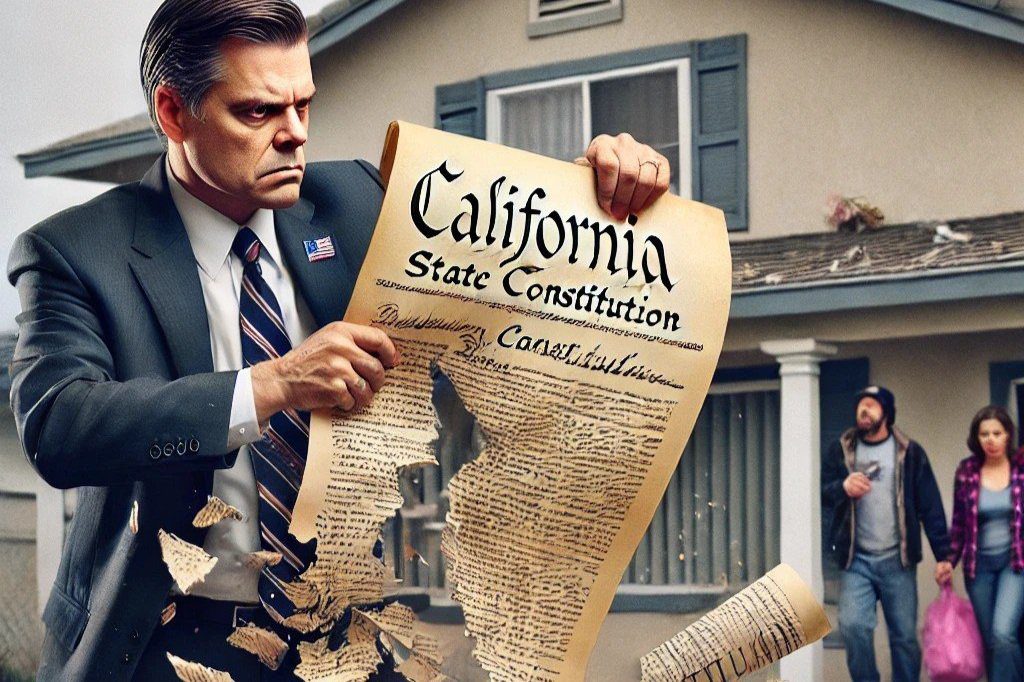
Image generated using Dall-E
Upending norms that date back to 1849, Prop 5 strips taxpayer protections that are enshrined in the State Constitution and reinforced by Prop 13—says Howard Jarvis Taxpayers Association’s Susan Shelley in this Opp Now exclusive Q&A. While the Bay Area’s RM4 may have been a uniquely spectacular ask, she warns it’s just the beginning: property owners should get ready for a relentless series of abusive bond measures every election, now and forever.
Opportunity Now: The Legislative Analyst’s Office says Prop 5 could increase funding by “at least a couple billion dollars over many years.” But RM4 alone would have raised $20 billion.
Susan Shelley: No one knows what it will cost at the local level. It all depends on what these different governments and agencies and districts decide to borrow, and how many of these local bonds pass.
But if Prop 5 passes, one of these will be on the ballot, or more than one, in every election forever. You do that for a couple of years, and they pass with 55% instead of two-thirds, and people will start losing their homes.Sign up to receive updates on Opp Now articles. Click HERE.
ON: Aren’t Californians protected by Prop 13?
SS: Prop 5 gets around Proposition 13. It will raise property taxes again and again and again.
Even though it will be up to the local voters, it will be fewer of the voters. We are actually losing a taxpayer protection that we’ve had since 1879.
ON: When you say fewer voters, you mean 55% instead of two-thirds. Isn’t a 55% majority more democratic than a two-thirds majority?
SS: This is an issue of fundamental rights. We are a republic. People in the United States, under the U.S. Constitution, have rights—even in California.
You have the right to your life, liberty, and property, and a majority cannot take those from you.
When you tax people, you’re taking their property, and to do it with a 55% majority does not protect your property rights as well as having a two-thirds supermajority.
ON: By property, you mean money that people are forced to pay in the form of a tax bill?
SS: At first. But if you can’t pay your property taxes, then the government sells your house out from under you.
That’s why the constitution requires more than just a bare majority to raise people’s taxes, and two thirds is the number they came up with.
This actually goes back to the 1849 constitution, where the legislature was directed to restrict the power of municipalities to take on debt, and the reason for that was to prevent abuses.
ON: What kind of abuses?
SS: RM4 was one of the most spectacular of the abusive bond measures. It asked for $20 billion, raising the property taxes on people in nine counties, and they didn’t even do the math correctly.
That’s an example of what you will see more of; maybe not at that scale, but you will see more of that. You’ll see carelessness because 55% is easier than two thirds.
ON: Isn’t two-thirds a rather steep threshold to get over?
SS: Voters will support local bonds for good projects at the two-thirds level.
But sometimes, given the property taxes they’re paying, they may not want to pay more than a certain amount.
So local governments could propose a project and tell them how much it’s going to cost. Voters may then want to trim that back a little bit. Instead of building 15 buildings, they’ll agree to build five, then see how it goes.
Voters would get to have that conversation before the proposal was put on the ballot. There would be polling, public outreach, and discussion of what it’s going to cost versus what it will accomplish, and if it could be paid for any other way.
ON: That sounds pretty democratic.
SS: When you get to the two-thirds consensus, voters will approve it. It’s not that they never approve any local bonds at the two-thirds level. They approve a lot of them.
But why should it be easier than two-thirds? Why should governments be incentivized to bloat their proposals? Because they don’t want to have to work for that hard-to-find consensus.
Follow Opportunity Now on Twitter @svopportunity

